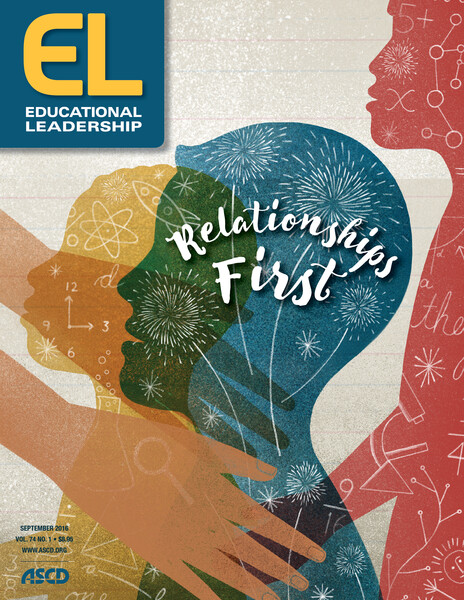The minute students first step into our classrooms, they begin assessing the environment, the teacher, and one another for clues about what to expect in the upcoming school year. Yet what do they usually encounter the first day? A teacher who's busy assigning seats, reviewing rules, and assessing various skills.
For much of my own teaching career, I fell into that trap—myopically focusing on establishing clear expectations and getting students used to classroom routines. As a result, I often neglected relationship building.
That changed when I heard Alan November speak about the importance of the first five days of school. November encouraged educators to use those first days to set a tone for powerful, engaging, and self-directed learning. As I listened to him, I thought, "I've been wasting the first week of school for the last seven years!" Now, I use a range of strategies that first week to learn about my students, pique their curiosity, learn about their passions, and start building relationships.
36 Questions
If we want to create a student-centered classroom, we must show our students that we value their thoughts, ideas, and input; we must encourage them to talk on that first day of class. Often the biggest hurdle to sparking vibrant student conversations is knowing the right questions to ask.
I found my inspiration while listening to Mandy Len Catron's TED talk, "Falling in Love Is the Easy Part." Catron describes an experiment conducted in a laboratory where two strangers discuss 36 questions designed to help them get to know each other and create a sense of intimacy (for example, What would constitute a "perfect" day for you? and Would you like to be famous? In what way?).1 Although Catron discusses these questions as they pertain to romantic love, I was struck by how universally interesting and relatable they were. I decided to use these questions to design an activity for the first week of school.
Our in-class version of this activity was low-tech: I printed out the questions and put each question on an index card. Students randomly selected a card, and we sat in pairs facing one another. Each pair had four minutes to ask and answer its question; then students rotated to different partners. The questions sparked some interesting conversations and helped break down the barriers that exist between students on the first day of class.
Although this activity took place entirely offline in the classroom, teachers can also make the questions available online and request that students select three to five questions to answer in an audio recording they share directly with the teacher. Students can record and send their messages via Google Drive or Google Voice, or use a voice recording app on their phone and e-mail their recordings to their teacher, enabling the teacher to learn a little about each student.
In-Class and Online Icebreakers
The first few days of school can be awkward. Students are surrounded by unfamiliar people. Teachers must help students move beyond their own insecurities and fears to form meaningful relationships.
For example, I use Socrative's Space Race feature to engage students in group quizzes, such as "Name That Movie Line" or "Pop Culture Quiz." Each quiz consists of 20 questions, which students work to answer in groups of four. Groups compete against one another, and as they answer each question correctly, their group's Space Race symbol (a rocket ship, a bicycle, and so on), moves forward on the screen that's projected on the board. It's incredible how quickly the awkwardness melts away as kids debate which movie contains the line, "Do. Or do not. There is no try."
By complementing these in-class icebreakers with online activities, teachers can also establish a safe digital space where students feel respected and supported. I post a series of online icebreakers the first week of school—questions like, If you could have lunch with any person from history, who would you choose and what would you ask him/her? This gives students the opportunity to build relationships online and practice the do's and don'ts of online communication. As most teachers can attest, not all students are comfortable engaging in real-time conversations. Allowing them to have conversations online, where they have some control over the time and place, encourages even shy students to jump in.
Instagram Challenge
Students already use and love social media, so why not hijack this opportunity for learning? One idea I've used during the first week of school is an Instagram challenge in which students follow a list of 25 clues designed to lead them to particular objects and locations around our classroom and on our campus. If teachers plan ahead, they can challenge their students at the end of each year to compile such a list of clues for next year's students.
Because some of my students do not have a smartphone or an Instagram account, they pair up to try to solve the clues. Once they figure out a clue and take a picture of the item or location, they use our unique hashtag and include my username in their posts so I can see their images.
The classroom and campus Instagram challenge is a simple strategy to encourage students to get to know their new surroundings. Many of my 9th grade students had no idea where the computer lab was or where to get a tardy pass. Once students have completed the list, they know their way around our school and feel more at home on our campus.
Off to a Good Start
By the end of the first week of school, my students know that our classroom is a student-centered learning environment. They realize that relationships and community building are essential if we are to learn effectively together. Finally, they know that I value their individual experiences and interests. If students leave school at the end of that first week feeling valued and respected, I've done my job.






